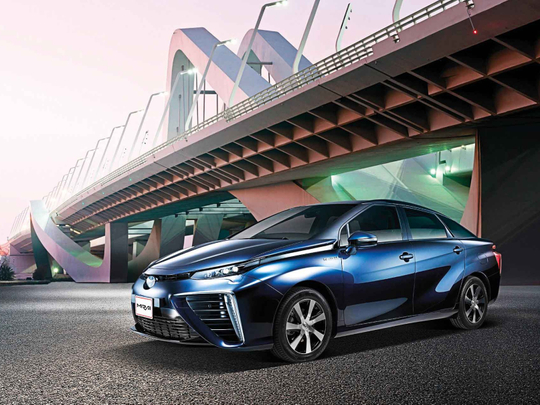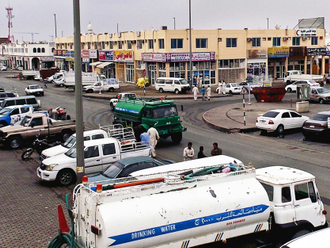
The next few years represent a period of drastic change for the automotive industry. Japan’s established brands are no exception.
The nation may not command the mainstream media’s attention in the manner that, say, Tesla does — Toyota has yet to build a Gigafactory; Nissan’s CEO doesn’t tout flamethrowers on Twitter — but the R&D being conducted by established companies under the Rising Sun could revolutionise commutes of the future.
“For every new technology to succeed, and in order to take it from niche to mainstream and make it a sensible solution for the masses, it is imperative to see serious cooperation between all concerned stakeholders,” Saud Abbasi, Managing Director of Al Futtaim Toyota, tells GN Focus. The world’s largest automobile manufacturer has been working on fuel cell electric vehicle (FCEV) technology since the Nineties, and launched its first passenger FCEV – the Mirai, pictured above – in 2014.
“We have been testing the car in the UAE since last year and will continue to do so until we are certain the technology is well suited to local conditions,” Abbasi says. A similar pilot programme is underway in Los Angeles, Project Portal, for heavy duty trucks. “Heavy duty vehicles make up a significant percentage of the annual emissions output worldwide,” he adds.
Tomorrow’s petrol?
The company initiated a three-year pilot of the Camry Hybrid Electric in the UAE with taxis in 2008. “If we look at the West and Japan, we can conclude that real powertrain changes in the green mobility movement happened when policymakers offered both manufacturers and consumers monetary and non-monetary incentives,” explains Abbasi.
“We are fortunate to be in the UAE, where the government has set clear environmental targets, and is making serious and fast changes towards a better preservation of the environment as well as finding alternative energy sources.
From an infrastructure perspective, Al Futtaim has partnered with French gas maker Air Liquide, as well as Masdar and Adnoc to study the possibility of establishing a network of hydrogen stations.
“We have already established our first hydrogen station [in the UAE] and started discussion with our partners regarding the second. Because FCEVs have the same cruising range (about 500km) and refuelling time (three to five minutes) as conventional petrol cars, the locations of stations can be stretched across the country.”
As part of the government’s sustaintability programme, Dubai Expo 2020 has signed on Nissan as its offical automotive partner. The agreement will see the Japanese firm provide the Expo 2020 fleet, including electric vehicles and next generation cars. Kalyana Sivagnanam, President of Nissan Middle East and Regional Vice-President of Marketing and Sales for Africa, the Middle East and India, says the partnership is a commitment to support the UAE’s aspirations of becoming a global role model for innovative mobility.
“Intelligent mobility solutions, which include full electrification of vehicles and the incorporation of advanced autonomous features, are becoming increasingly available in markets around the world,” he says.
“With complete integration into smart grids, as well as advanced ProPILOT capabilities, the Nissan Leaf will change the way we conceive of and use vehicles when it is introduced to the UAE. It will be a major step forward for electric and autonomous vehicles in the region.”
The Yokohama-headquartered car giant revealed its Brain to Vehicle technology at CES in Las Vegas last month. The system, which relies on a vehicle’s driver wearing a hefty EEG headset, analyses the brain to predict when he or she is about to initiate a movement — such as turning or braking — and readies the car for this.
The skullcap is also part of the vehicle’s autonomous ecosystem, learning driver brain patterns to help move the car to their preferred lane on a particular stretch of highway, for example. “We are also set to begin trials with a range of partners to advance Cellular Vehicle to Everything technologies that will revolutionise autonomous driving,” adds Sivagnanam.
The Renault-Nissan-Mitsubishi Alliance accounted for more than one in nine vehicles sold globally in 2017 – 10.6 million. Under the Alliance 2022 programme, the three carmakers will collaborate in areas such as next-generation electric, autonomous technologies, powertrains and common platforms.
Approaches to eco-friendly solutions vary among Japan’s automotive brands. Last year, Mazda introduced the SkyActive X engine, which the brand calls a breakthrough in combustion engine development.
“The SkyActive X engine will deliver more torque than a petrol engine but consume less petrol and C02 than a normal engine,” says Axel Dreyer, General Manager of Galadari Automobiles, Mazda’s distributor in the UAE.
“Simultaneously, Mazda has set the right course for hybrid technology with its collaboration with Toyota.” He expects both technologies in the UAE in the next three years.
Change in perception
Mazda significantly increased market share last year and Dreyer expects the brand to further strengthen its market position despite a challenging start to the year for the automotive sector in the UAE.
“In the UAE, customers value the quality, craftsmanship and reliability of Japanese cars. Due to global demand, the majority of Japanese automobile manufacturers have opened plants all over the world in countries with lower wages to reduce production cost — this is diluting the perception of quality slightly.” He adds that all Mazda models sold in the GCC are made in Japan.
“Mazda will move into the premium category using features and technologies that had been reserved for higher-priced competitors.”
Another brand working to enhance its reputation in the luxury segment is Nissan-owned premium marque Infiniti. However, luxury can be a fluid concept. “The general perception of luxury in the past was limited to design, interior and the power of the brand name,” explains Michel Ayat, CEO of Arabian Automobiles, distributor for Infiniti in Dubai and the Northern Emirates. “With time, the definition changed to also include technology, the engine mechanism, durability and overall efficiency of a car, in addition to the customer experience with the brand. ”
For auto brands aiming to grow in the luxury space, Ayat believes the overall customer experience is key — not just in-car features. For example, interested buyers can register for Infiniti’s QX80 Elite Drive, where the top-line SUV is delivered to their residence for them to test drive in their own surroundings.
“Our buyer profile has changed significantly over the past few years. There’s been an increase in female customers and across all nationalities – where we first catered mostly to the Emirati and Arab audience, we’ve now cemented our presence among expat communities.”






